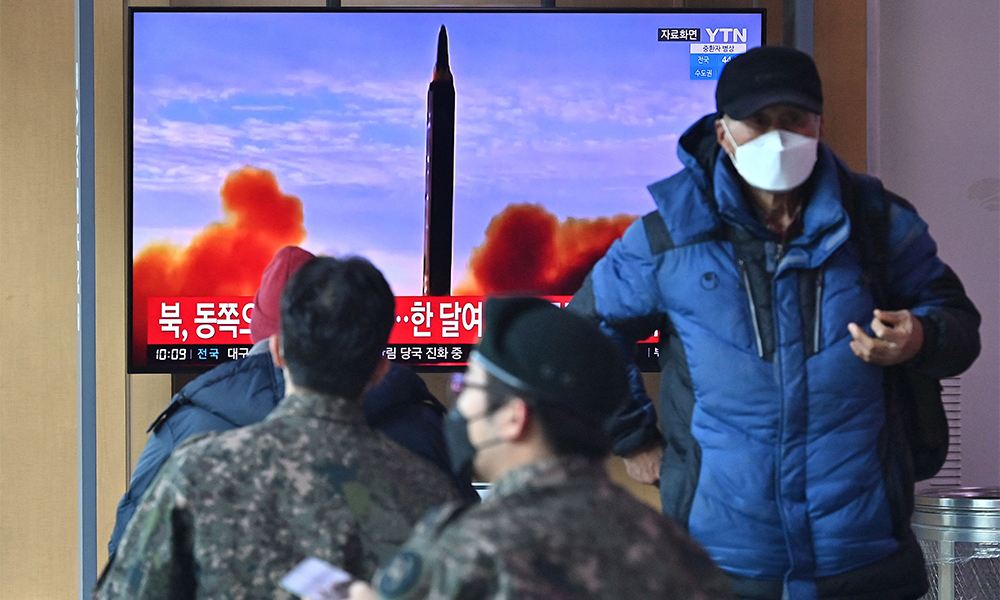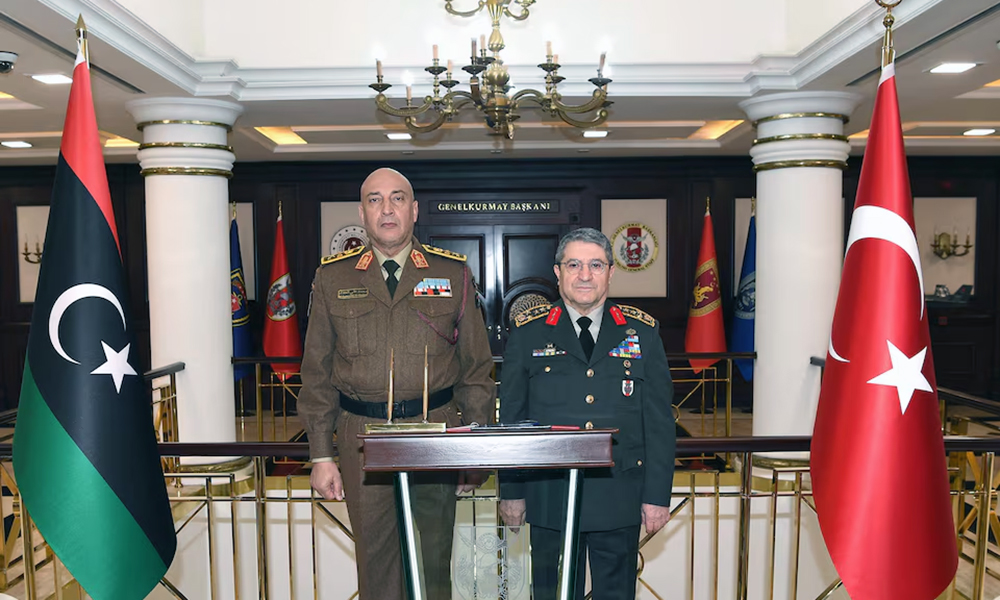World
N.Korea resumes missile tests with first launch in a month

North Korea fired what could be a ballistic missile on Sunday, military officials in South Korea and Japan said, in what would be the first test since the nuclear-armed country conducted a record number of launches in January, Reuters reported.
South Korea’s Joint Chiefs of Staff reported that North Korea had fired a suspected ballistic missile toward the sea off its east coast from a location near Sunan, where Pyongyang’s international airport is located.
According to Reuters the airport has been the site of missile tests, including a pair of short-range ballistic missiles fired on Jan. 16.
Sunday’s missile flew around to a maximum altitude of around 620 km (390 miles), to a range of 300 km (190 miles), JCS said.
Analysts said the flight data didn’t closely match earlier tests, and suggested it could be a medium-range ballistic missile fired on a “lofted” trajectory.
“There have been frequent launches since the start of the year, and North Korea is continuing to rapidly develop ballistic missile technology,” Japan’s Defense Minister Nobuo Kishi said in a televised statement. North Korea was threatening the security of Japan, the region and the international community, he said.
The United States condemned the latest launch and called on North Korea to cease destabilising acts, but said the test did not pose an immediate threat, said the U.S. military’s Indo-Pacific Command, read the report.
North Korea’s last test was on Jan. 30, when it fired a Hwasong-12 intermediate range ballistic missile.
The largest weapon test-fired since 2017, the Hwasong-12 was reported to have flown to an altitude of about 2,000 km (1,200 miles) and range of 800 km (500 miles). That capped a record month of mostly short-range missile launches in January.
LAUNCH AMID S.KOREA ELECTION, ‘PUTIN’S WAR’
Sunday’s launch came less than two weeks ahead of South Korea’s March 9 presidential election, amid fears by some in Seoul and Tokyo that Pyongyang may push ahead with missile development while international attention is focused on Russia’s invasion of Ukraine.
“This launch comes as the international community is responding to the Russian invasion of Ukraine, and if North Korea is making use of that situation, it is something we cannot tolerate,” Kishi said.
South Korea’s National Security Council convened an emergency meeting to discuss the launch, which it called “regrettable”, according to a statement from the presidential Blue House, Reuters reported.
“Launching a ballistic missile at a time when the world is making efforts to resolve the Ukraine war is never desirable for peace and stability in the world, the region, and on the Korean Peninsula,” the statement said.
The leading conservative candidate, Yoon Suk-Yeol, warned last week that North Korea could see the Ukraine crisis as “an opportunity for launching its own provocation.”
Candidates and analysts have noted, however, that even before the invasion North Korean leader Kim Jong Un was overseeing an increase in missile tests as talks with the United States and its allies remain stalled.
“Putin’s War shapes almost all geopolitics right now, and should factor somewhere in Kim’s calculus — but even ‘taking advantage of distraction’ seems to presume too much, since (North Korea) was already testing aggressively before the war,” John Delury, a professor at South Korea’s Yonsei University, said on Twitter.
OLYMPIC LULL IN TESTING
China’s representative on the Korean Peninsula, Liu Xiaoming, said on Sunday he spoke by phone with his U.S. counterpart, Sung Kim, and urged the United States to address North Korea’s legitimate and reasonable concerns with greater attention, so as to create conditions for restarting dialogue.
“I pointed out that, under current situation, relevant parties should be cautious in words and actions, avoid stimulating each other, so as to prevent escalation of tension on the Korean Peninsula,” Liu said on Twitter, without specifying when the phone conversation took place and without mentioning the latest test.
North Korea, which has close ties to China, did not test any missiles during the Beijing Olympics in February. The 2022 Winter Paralympics begin in Beijing on Friday.
Complaining of unrelenting “hostile policies” from the United States, North Korea has suggested it could resume testing its longer-range missiles or even nuclear weapons.
Pyongyang has an ambitious schedule of military modernisation, and the Kim regime’s strength and legitimacy have become tied to testing ever-better missiles, said Leif-Eric Easley, a professor at Ewha University in Seoul.
“North Korea is not going to do anyone the favour of staying quiet while the world deals with Russia’s aggression against Ukraine,” he said.
Washington says it is open to talks with North Korea without preconditions, but Pyongyang has so far rejected those overtures as insincere, Reuters reported.
North Korea’s ballistic missile launches are banned by United Nations Security Council resolutions, which have imposed sanctions on the country over its missile and nuclear weapons programmes.
In its first comments since Russia’s Thursday invasion of Ukraine, North Korea’s foreign ministry on Saturday posted a statement by a researcher calling the United States the “root cause” of the European crisis for pursuing unilateral sanctions and pressure while disregarding Russia’s legitimate demands for its security.
World
Libyan army’s chief dies in plane crash in Turkey
Turkish Justice Minister Yilmaz Tunc said an investigation into the crash was under way.

The Libyan army’s chief of staff, Mohammed Ali Ahmed Al-Haddad, died in a plane crash on Tuesday after leaving Turkey’s capital Ankara, the prime minister of Libya’s internationally recognised government said, adding that four others were on the jet as well, Reuters reported.
“This followed a tragic and painful incident while they were returning from an official trip from the Turkish city of Ankara. This grave loss is a great loss for the nation, for the military institution, and for all the people,” Libyan Prime Minister Abdulhamid Dbeibah said in a statement.
He said the commander of Libya’s ground forces, the director of its military manufacturing authority, an adviser to the chief of staff, and a photographer from the chief of staff’s office were also on the aircraft.
Turkish Interior Minister Ali Yerlikaya said on social media platform X that the plane had taken off from Ankara’s Esenboga Airport at 1710 GMT en route to Tripoli, and that radio contact was lost at 1752 GMT. He said authorities found the plane’s wreckage near the Kesikkavak village in Ankara’s Haymana district.
He added that the Dassault Falcon 50-type jet had made a request for an emergency landing while over Haymana, but that no contact was established.
The cause of the crash was not immediately clear.
Turkish Justice Minister Yilmaz Tunc said an investigation into the crash was under way.
The Tripoli-based Government of National Unity said in a statement that the prime minister directed the defence minister to send an official delegation to Ankara to follow up on proceedings.
Walid Ellafi, state minister of political affairs and communication for the GNU, told broadcaster Libya Alahrar that it was not clear when a crash report would be ready, but that the jet was a leased Maltese aircraft. He added that officials did not have “sufficient information regarding its ownership or technical history,” but said this would be investigated.
Libya’s U.N.-recognised Government of National Unity announced official mourning across the country for three days, read the report.
Turkey’s defence ministry had announced Haddad’s visit earlier, saying he had met with Turkish Defence Minister Yasar Guler and Turkish counterpart Selcuk Bayraktaroglu, along with other Turkish military commanders.
The crash occurred a day after Turkey’s parliament passed a decision to extend the mandate of Turkish soldiers’ deployment in Libya by two more years.
NATO member Turkey has militarily and politically supported Libya’s Tripoli-based, internationally recognised government. In 2020, it sent military personnel there to train and support its government and later reached a maritime demarcation accord, which has been disputed by Egypt and Greece.
In 2022, Ankara and Tripoli also signed a preliminary accord on energy exploration, which Egypt and Greece also oppose, Reuters reported.
However, Turkey has recently switched course under its “One Libya” policy, ramping up contacts with Libya’s eastern faction as well.
World
Trump administration recalls dozens of diplomats in ‘America First’ push
The State Department declined to name those affected, with a senior official calling the recalls a routine step for new administrations.

The Trump administration is recalling nearly 30 U.S. ambassadors and senior career diplomats to ensure embassies align with President Donald Trump’s “America First” agenda, a move critics say could weaken U.S. credibility abroad.
The State Department declined to name those affected, with a senior official calling the recalls a routine step for new administrations. The official said ambassadors are the president’s representatives and must advance his policy priorities.
However, officials familiar with the matter said the recalls largely affect career Foreign Service officers posted to smaller countries, where ambassadors are traditionally non-partisan. Those ordered back to Washington were encouraged to seek other roles within the State Department.
The American Foreign Service Association said some diplomats were notified by phone without explanation, calling the process “highly irregular” and warning that such actions risk harming morale and U.S. effectiveness overseas. The State Department did not respond to the criticism.
The move, first reported by Politico, comes as Trump seeks to place loyalists in senior roles during his second term, after facing resistance from the foreign policy establishment in his first.
Democrats have criticised the decision, noting that around 80 ambassadorial posts remain vacant. Senator Jeanne Shaheen said the recalls undermine U.S. leadership and benefit rivals such as China and Russia.
World
Trump plans expanded immigration crackdown in 2026 despite backlash
The plans come amid rising public unease over aggressive tactics, including neighborhood raids and the detention of some U.S. citizens.

U.S. President Donald Trump is preparing to significantly expand his immigration crackdown in 2026, backed by billions of dollars in new funding, even as political opposition grows ahead of next year’s midterm elections.
ICE and U.S. Customs and Border Protection are set to receive an additional $170 billion through September 2029, enabling the administration to hire thousands of new agents, expand detention facilities and increase enforcement actions, including more workplace raids. While immigration agents have already been surged into major U.S. cities, many economically critical workplaces were largely spared in 2025.
The plans come amid rising public unease over aggressive tactics, including neighborhood raids and the detention of some U.S. citizens. Trump’s approval rating on immigration has fallen from 50% in March to 41% in mid-December, according to recent polling.
The administration has also revoked temporary legal status for hundreds of thousands of Haitian, Venezuelan and Afghan migrants, expanding the pool of people eligible for deportation.
About 622,000 immigrants have been deported since Trump took office in January, short of his goal of 1 million deportations per year.
White House border czar Tom Homan said arrests will increase sharply next year as staffing and detention capacity grow. Critics warn that expanded workplace enforcement could raise labor costs and deepen political and economic backlash ahead of the elections.
-

 Latest News1 day ago
Latest News1 day agoAfghanistan exports 10 containers of batteries to Saudi Arabia and UAE for first time
-

 Latest News1 day ago
Latest News1 day agoPakistani cleric condemns lifetime immunity for Army Chief as un-Islamic
-

 Latest News3 days ago
Latest News3 days agoAfghanistan signs 30-year deal for marble mining in Daikundi
-

 Latest News5 days ago
Latest News5 days agoPakistan summons Afghan diplomat over deadly attack in North Waziristan
-

 Latest News4 days ago
Latest News4 days agoAfghan health minister calls for medical cooperation between Kabul and New Delhi
-

 Latest News4 days ago
Latest News4 days agoKarzai urges reopening of girls’ schools and universities for Afghanistan’s bright future
-

 Latest News4 days ago
Latest News4 days agoBush Institute criticizes Trump administration’s Afghan immigration freeze
-

 International Sports1 day ago
International Sports1 day agoAriana News to broadcast key AFC Champions League Two clash























